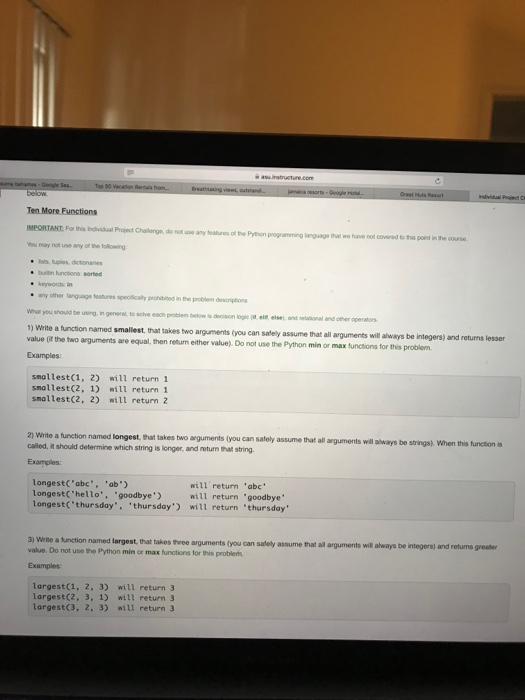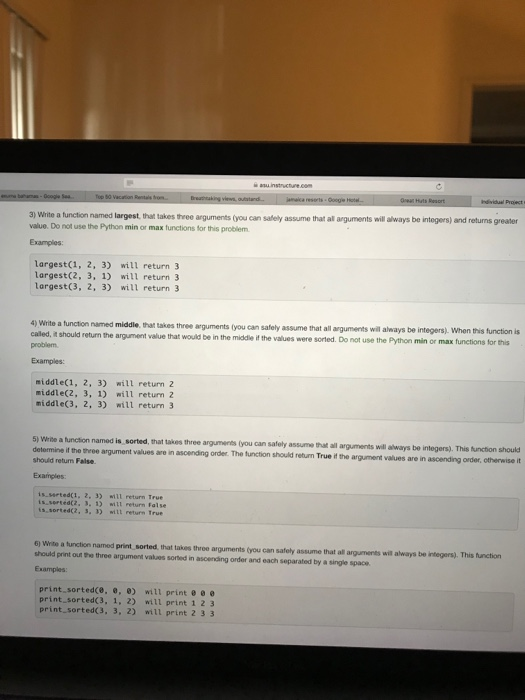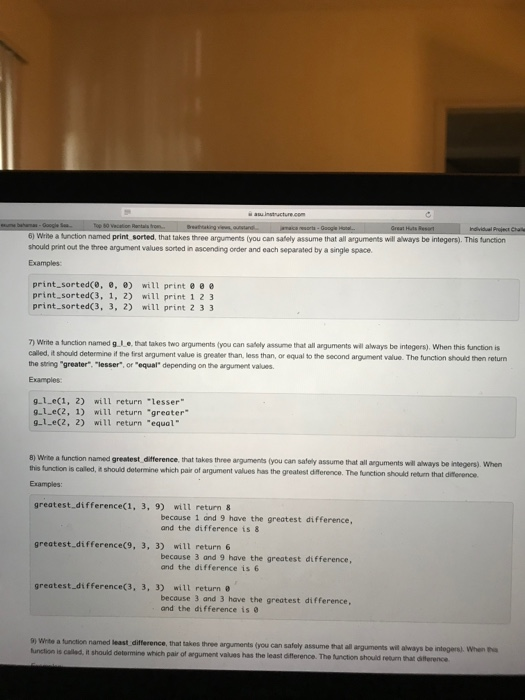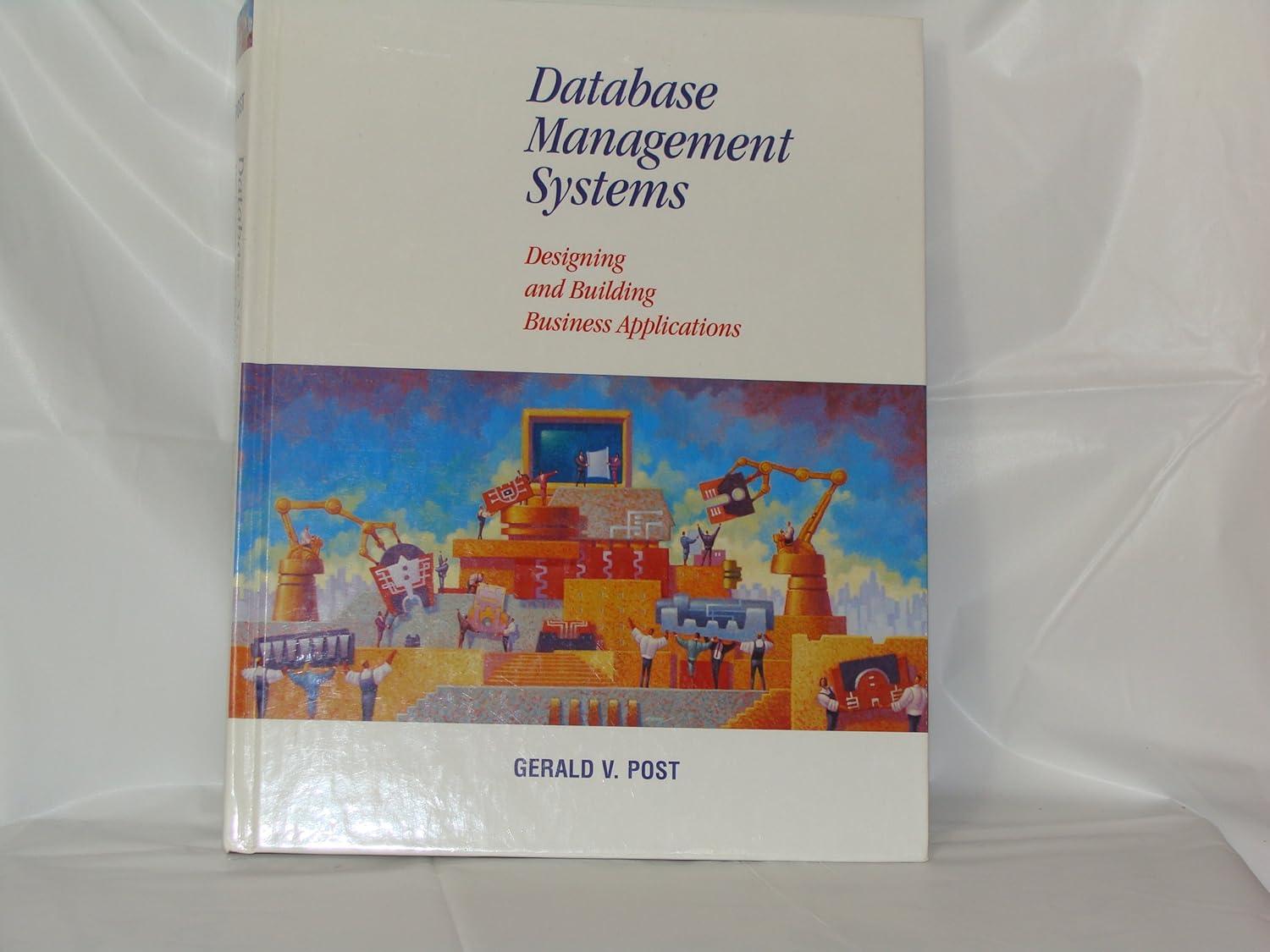Its due in a couple hours please help! Thank you!

Ten More Functions MPORTANT For this Indvidual Project Chatenge, do not use any loatures of the Pyhon programming language thatl we have not covered to this point in the couse may not use any of the folowing unctions sorted keywords in any other language teatures speciically prohibited in he problem desriptio you should be using, in general, to soive each problem below decision logie it elt elsei, and elational and other operators 1) Wite a function named smallest, that takes two arguments (oyou can safely assume that all arguments value (if the two arguments are equal, Examples will always be integers) and returns lesser then return either value) Do not use the Python min or max functions for this problem smallestC1, 2) will return 1 smallest(2, 1) will return 1 smallest(2, 2) will return 2 arguments will lalways be strings) When this function s 2) Write a function named longest, hat takes two arguments (you can safely assume that all called, it should determine which string is longer, and return that string Examples: longest 'abc', 'ab' Longest ('hello, goodbye) will return 'abc will return 'goodbye Longest('thursday', 'thursday) will return 'thursday 3) Wrine a function named largest, that takes tree arguments (you value. Do not use the Python min or max functions for this problerm Examples can sately assume that all arguments will always be integers) and returns greate largest(1, 2, 3) will return 3 largest(2, 3, 1) will return 3 Largest(3, 2, 3) will return 3 t that takes threee arguments (you can safely assume that all arguments will always be integers) and returns greater 3) Write a function named largest value. Do not use the Python min or max functions for this problem Examples: largest(1, 2, 3) will return 3 Largest(2, 3, 1) will return3 targest(3, 2, 3) will return3 4 Write a tunction named middle that takes three arguments (you can safely assume that all arguments will always be integers). Whon this function is t should returm the argument value that would be in the middle if the values were sorted. Do not use the Python min or max functions for this problem Examples: middle(1, 2, 3) will return 2 middle(2, 3, 1) will returm 2 middle(3, 2, 3) will return 3 5) Weite a function named is sorted, that takes three arguments (you determine if the 00 argument are should retum False can safely assume that all arguments will always be integers). This function should values are in ascending order. The function should return True if the argument values are in ascending order, otherwise it Examples is.sertedCc1, 2, 3) will return True is.sertdc2, 3. 1)wilt return False ts,sortedc2, 3, 3) witt returm True 6) Wite a tunction named print sorted, that takes three arguments (you can safely assume that all arguments will always be integers). This function should print out tbhe three argument vales sorted in ascending order and each separated by a single space Examples: print sortedce, e, 0) will print e ee print.sorted(3, 1, 2) will print 1 23 print sortedC3, 3, 2) will print 23 3 Individual Proje 6) Wrihe a tunction named print sorted, that takes theee arguments (you can safely assume that all arguments will always be integers). This tunction should print out the three argument values sorted in ascending order and each separated by a single space. Examples print.sortedce, e, ) will print 8 print.sorted(3, 1, 2) will print 1 2 3 print.sorted(3, 3, 2) will print 2 3 3 ) Wirite a function named g Le, that takes two arguments (you can safely assume that all arguments will alwarys be integers). When this function s caliled, it shouid determine if the first argument value is greater than, less than, or equal to the second argument value. The function should then return the string greater", "lesser", or "equal" depending on the argument values Examples 9-1-e(1,2) will returnlesser" g.1 e(2, 1) will return "greater 91 e(2, 2) will return "equal 8) Write a function named greatest difference, that takes three arguments (you can sately assume that all arguments will this function is called, # shouid determine which pair of argument values has the greatest dference. The function should reburn that difference Examples always be integers). When greatest difference(1, 3, 9) will return& becouse 1 and 9 have the greatest difference, and the difference is 8 greatest.difference(9, 3, 3) will return 6 becouse 3 and 9 have the greatest difference, and the difference is 6 greatest.difference(3, 3, 3) will return becouse 3 and 3 have the greatest difference, and the difference is 9) Wite a function named least difference,that takes three arguments (you can safely assume that all arguments wi always be integers). when ha i argument values has the least difference. The function shouild return that diference 9) Write a function named least difterence, that takes three unction is called, it should determine Examples: arguments (you can safely assume that all arguments will always be integers) When this which pair of argument values has the least difference. The function should retum that diference. least difference(1, 3, 9) return 2 teast difference(9, 3, 3) will return least difference(3, 2, 1) wil1 return 1 because 1 and 3 have the least difference, and the difference is 2 becouse 3 and 3 have the least difference, and the difference is becouse both 3 and 2, and 2 and 1 have a difference of 1, whtle 3 and 1 has a difference of 2 arguments will always be strings). When this tunction is concatenated in any order to form the tourth string value The function should 10) Wrile a function named has parts, that takes four arguments (you can safely assume that al called, it should determine if any two of the first three string values can be return True or False depending on the argument values Examples has partsC'a, 'bc 'def, 'defa') will retun True becouse 'def and 'a' can be concatenated to form 'defa has partsC'a, 'bc', 'def, 'adef) will return True because 'a" and "def' can be concatenated to form 'adef has partsC'a, 'bc "def, 'defb witl return False by concatenat ion any two of the strings C'abe. and 'def') to form 'defb' has.partsC'a, 'abcaba) wil1 return True becouse 'a' can be concatenated with itself to form 'oa











